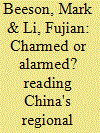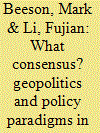| Srl | Item |
| 1 |
ID:
110070


|
|
|
|
|
| Publication |
2012.
|
| Summary/Abstract |
China has rapidly re-emerged as a major regional power in East Asia. Although this represents a return to a long-established historical pattern, the ability of China's political elites to reassure nervous neighbours about the implications of its rise will be a major test of its evolving and increasingly sophisticated foreign policies. In this paper we focus primarily on China's regional engagement strategies, detailing the way such initiatives are understood in China, and the way they are received elsewhere. We focus primarily on the political and economic impacts of China's policies, and briefly consider their reception in Northeast Asia and Southeast Asia. We highlight the different dynamics and issues that China's policymakers must consider in each area, and suggest that despite some difficulties and tensions, on balance, China's policies are proving surprisingly effective.
|
|
|
|
|
|
|
|
|
|
|
|
|
|
|
|
| 2 |
ID:
138339


|
|
|
|
|
| Summary/Abstract |
The Washington Consensus is not what it was. A model of development associated with the Untied States, it has been diminished both by apparent failures, widespread criticism and by the recent economic crisis that had its origins in the US. Anglo-American capitalism has lost a good deal of its influence and attractiveness. As a consequence, alternative models of development have become more prominent, especially the so-called Beijing Consensus. The authors argue that at one level this evolving policy discourse and debate reflects a long-term structural change in the relative positions of China and the United States. However, it is far from clear that this transformation has gone far enough to underpin a significant ideational or policy challenge on China's part. On the contrary, the debate in China demonstrates that there is little appetite for, or expectation of, a major paradigm change in the near future.
|
|
|
|
|
|
|
|
|
|
|
|
|
|
|
|